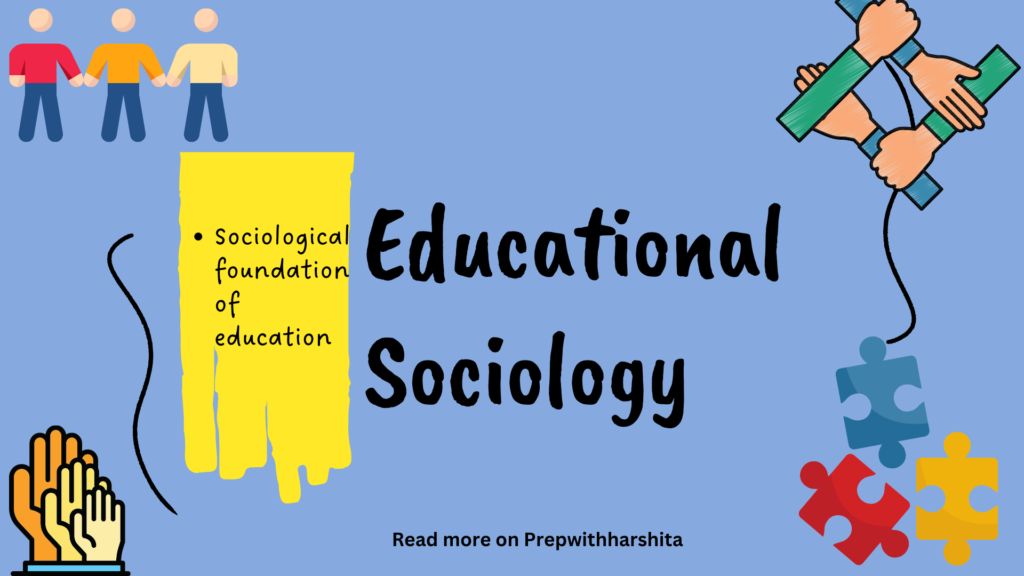Educational sociology is a branch of sociology that focuses on studying the social aspects of education systems, institutions, and processes. It examines the interactions between individuals, social groups, and larger social structures within educational contexts.
Key components and areas of study within educational sociology:
- Education as a Social Institution: Educational sociology views education as a social institution, meaning it analyzes how education functions within broader societal structures and systems. It examines the role of education in socializing individuals, reproducing social inequalities, and promoting social cohesion.
- Socialization and Education: Educational sociology investigates how education plays a crucial role in the socialization of individuals. It examines how educational institutions transmit knowledge, cultural values, norms, and social roles to students. This includes studying how educational settings shape individuals’ identities, beliefs, attitudes, and behaviors.
- Social Stratification and Inequality: Educational sociology analyzes the relationship between education and social stratification. It explores how educational systems contribute to the reproduction or transformation of social inequalities based on factors such as social class, race, ethnicity, gender, and other dimensions of social difference. It examines issues like educational access, educational attainment gaps, tracking, and the impact of socio-economic background on educational outcomes.
- Educational Policy and Reform: Educational sociology investigates educational policies and their effects on educational systems and societies. It examines the ways in which educational policies are formulated, implemented, and their implications for educational practices, equality, and social change. It critically analyzes the impact of policy initiatives, such as curriculum reforms, standardized testing, accountability measures, school funding, and educational governance structures.
- School Culture and Organization: Educational sociology studies the organizational and cultural aspects of schools. It explores how school structures, rules, and norms shape interactions between teachers, students, administrators, and other stakeholders. It examines factors that influence school climate, social dynamics, and the formation of student subcultures.
- Teacher-Student Relationships: Educational sociology investigates the dynamics of teacher-student relationships and their impact on educational outcomes. It explores how teacher-student interactions, classroom dynamics, and instructional practices influence student learning, motivation, and socialization. It examines factors such as teacher expectations, classroom climate, student engagement, and the role of power in educational settings.
- Education and Social Change: It examines the relationship between education and social change. It investigates how educational systems respond to and influence broader social, cultural, economic, and technological transformations. It analyzes the role of education in promoting social mobility, social integration, cultural innovation, and societal progress.
- Comparative and International Education: It also engages in comparative and international studies, comparing educational systems and practices across different societies and countries. It examines how educational policies, practices, and outcomes vary across contexts, considering factors such as cultural differences, political systems, and economic conditions.
Overall, educational sociology provides insights into the social dynamics of education, shedding light on the complex interplay between education, society, and individuals. By examining the social dimensions of education, it aims to inform educational policies, practices, and reforms that promote equity, social justice, and positive social change.
Also Read: Education and Cultural Change

Also Visit: Prep with Harshita


when i read this article, i got some useful information for me to learn. thank you for publishing this article.
I am lucky to have found this thank you and here is my site
so good I was lucky to have found this on Google and it helped me to estimate my website, please see Google this site i found this very lucky
I never expected to get information like this from your article, thank you very much for the information..
This article provides good information, thank you for publishing this article
Thank you very much for publishing this article, I can increase my insight about something like that.
Wow, the article is very interesting, the language is also light so it is easy to read. Thank you for sharing this information.
I just found out about this after reading your post. It turns out there are many things that we often miss, huh. Good job.
Cool, it’s rare for someone to discuss this topic in this depth. Keep up the good work on your content.
Wow, this article really opened my eyesThe topic of buying a home can often seem complicated, but you managed to explain it in a simple way. I wish more people would read helpful guides like this.
This article is very completeIt might be more interesting if a small checklist is added for prospective buyers to make it easier to practice these tips.
When I was looking for my first home, I was confused by the many choices. This article really helped me focus on the main factors, especially the safety of the environment.
Wow, the article is very interesting, the language is also light so it is easy to read. Thank you for sharing this information.
Thank you for sharing this useful content. I really liked the way you explained everything so clearly. I wrote something related recently as well
This article is very informative and covers the topic in great depth. I like the way the author presents the facts clearly.
The discussion in this article is very comprehensive and has increased my knowledge significantly.
This is an example of a good article, with in-depth research and clear delivery
With its sleek interface and flawless functionality, this platform delivers an exceptional user experience. Every detail is crafted with care, making togel 4d something that genuinely deserves recognition.